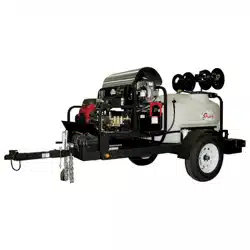Loading ...
Loading ...
Loading ...

Kärcher TRS-SSG • Operators • 9.801-330.0-K
OPERATOR’S MANUAL
PRESSURE WASHER
8
WEAR PATTERN CAUSE ACTIONACTION
Center
Wear
Over
Infl ation
Adjust pressure
to particular
load per tire
catalog.
Edge
Wear
Under
Infl ation
Adjust pressure
to particular
load per tire
catalog.
Side Wear
Loss of
camber or
overloading
Make sure load
doesn't exceed
axle rating.
Align at
alignment shop.
Toe Wear
Incorrect
toe-in
Align at
alignment shop.
Cupping
Out of
balance
Check bearing
adjustment and
balance tires.
Flat
Spots
Wheel
lockup & tire
skidding
Avoid sudden
stops when
possible and
adjust brakes.
WHEEL
SIZE
TORQUE SEQUENCE
1st Stage 2nd Stage 3rd Stage
15" 20 - 25 50 - 60 80-90
Wheel Torque Requirements
Ball Coupler Hitches
Coupler assembly includes a latch lever and latch
lever safety pin or hitch pin. Be sure the latch lever is
locked and the pin properly secured before moving
your trailer. The pin can be engaged fully only if ball
is properly seated in the coupler.
Tires
Before mounting tires onto wheels make certain that
the rim size and contour is approved for the tire as
shown in the Tire and Rim Association Yearbook or
the tire manufacturer’s catalog. Also make sure the
tire will carry the rated load. If the load is not equal
on all tires due to trailer weight distribution, use the
tire rated for the heaviest wheel position.
NOTE: The capacity rating molded into the sidewall of
the tire is not always the proper rating for the tire if used
in a trailer application. Use the following guideline:
1. LT and ST tires: use the capacity rating molded
into the tire.
2. Passenger Car Tires: Use the capacity rating
molded into the tire sidewall divided by 1.10.
Use tire mounting procedures as outlined by the
Rubber Manufacturer’s Association or the tire manu-
facturers.
WHAT TO CHECK AND HOW TO CHECK
NOTE: Tire wear should be checked frequently
because once a wear pattern becomes fi rmly
established in a tire it is diffi cult to stop, even
if the underlying cause is corrected.
Loading ...
Loading ...
Loading ...
